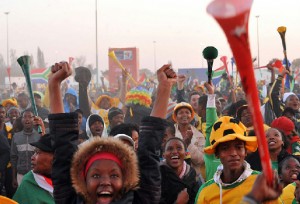In thinking about public diplomacy, one usually thinks of radio broadcasts, exchange programs, television ads, newspaper prints, embassy events, internet videos and speaking tours. While these modes of public diplomacy are perhaps the most common, there are many other types of public diplomacy constantly taking place right under our noses though we may not realize it.
The Olympics, for example, is an extremely popular public diplomacy extravaganza that occurs every two years—in 2012 over two hundred and four countries participated in the Summer Games. The country that hosts the Olympic Games often receives a boost its soft power rating, as do countries which do well in the medals competition. Hosting the Olympics affords the host nation the opportunity to put its culture on display for the whole world to see. The Olympics has the ability to promote a degree of cultural understanding on a grand scale that many public diplomacy efforts would be envious of.
 As mentioned above, sporting events such as the Olympics can be a great tool to be utilized by public diplomacy practitioners. The Tour de France, 24 Hours at Le Mans, World Cup Soccer, The Super Bowl, The Majors, Wimbledon, The World Series, and the Rugby World Cup are all majorly popular sporting events that require no introduction or explanation. These events are able to generate massive amounts of soft power to countries who participate in them. The car that wins Le Mans, for example, may purport its country to have the best engineers that can build the most reliable and fastest cars. Each of these events carries with it an opportunity to gain international prestige on some new level.
As mentioned above, sporting events such as the Olympics can be a great tool to be utilized by public diplomacy practitioners. The Tour de France, 24 Hours at Le Mans, World Cup Soccer, The Super Bowl, The Majors, Wimbledon, The World Series, and the Rugby World Cup are all majorly popular sporting events that require no introduction or explanation. These events are able to generate massive amounts of soft power to countries who participate in them. The car that wins Le Mans, for example, may purport its country to have the best engineers that can build the most reliable and fastest cars. Each of these events carries with it an opportunity to gain international prestige on some new level.
Other types of international competitions, such as the Cold War Space Race between the Soviet Union and the United States, can also be viewed as a pronunciation of soft power. The main focus of the Space Race was the desire to demonstrate one nation’s technological and ideological superiority over the other but was also a means to obtain international bragging rights and prestige. Some astronauts became international celebrities, going on speaking tours around the world promoting America’s scientific achievements in space.
Music is another aspect of public diplomacy that sometimes goes overlooked. Music can be one of the most memorable and moving aspects of culture and is often able to cross cultural boundaries. Musicians sometimes become internationally celebrated figures who embody a certain amount of national soft power. Some argue that the Cold War was actually won because of the effects that rock and roll had against censorship inside the Soviet Union.
One final, perhaps more obscure, overlooked aspect of public diplomacy is the desire many nations share in setting what seem to be arbitrary records. These record setting events are sometimes a matter of national pride. These rivalries, such as the competition to build the world’s tallest skyscraper, can have a large impact on a country’s morale. The Empire State Building, for example, was the world’s tallest skyscraper for 42 years and was (and still is) a source of immense pride for many Americans. Other achievements include deep sea exploration, expeditions to the poles, climbing Mount Everest, and various land and air speed records.
While these efforts may seem arbitrary or even silly, they can provide countries a platform from which they can exhibit soft power, and use that soft power advantage for strategic means, like building partnerships or increasing investment from abroad. As countries gain recognition for a seemingly worthless feat, such as the Kola Superdeep Borehole in Russia, they evoke an emotion in the people of other nations which, if properly exhibited, have the potential to be effective tools of public diplomacy.


